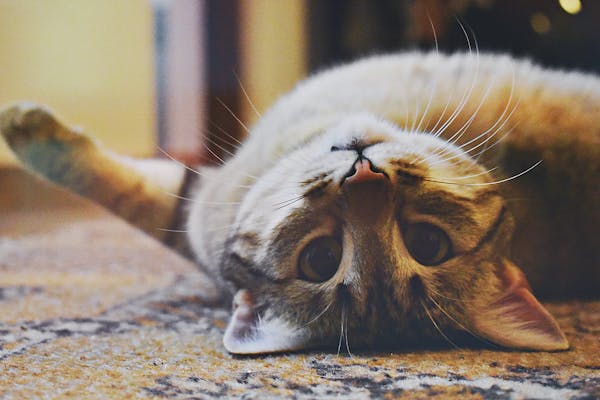Cats, like humans, can experience anxiety, and it often manifests in a variety of behavioral or physical changes. Understanding the causes of feline anxiety and learning how to help your cat cope can significantly improve their quality of life. Whether your cat is facing stress due to changes in its environment or has underlying medical issues, here are some effective strategies to help alleviate your cat’s anxiety.
1. Understand the Signs of Anxiety in Cats
Before addressing your cat’s anxiety, it’s crucial to recognize the signs. Cats tend to express their stress in subtle ways, including:
- Hiding: Seeking secluded places more often than usual.
- Excessive Grooming: Over-licking themselves, sometimes leading to bald spots.
- Aggression: Unusual hissing, biting, or swatting.
- Loss of Appetite: Reduced interest in food or eating less than normal.
- Vocalization: Uncharacteristic or excessive meowing.
- Litter Box Issues: Avoiding the litter box or having accidents outside it.
If you notice any of these symptoms, it’s important to identify the potential cause of the anxiety and take steps to address it.
2. Identify the Causes of Anxiety
There are many potential triggers for anxiety in cats, including:
- Environmental Changes: A new home, new pet, or a family member moving in or out can all contribute to stress.
- Loud Noises or Changes in Routine: Loud noises like fireworks, thunderstorms, or construction, as well as deviations from the cat’s normal schedule, can be distressing.
- Separation Anxiety: Some cats are particularly attached to their owners and feel anxious when left alone for long periods.
- Medical Issues: Anxiety can also stem from pain, illness, or age-related problems like cognitive decline.
3. Create a Safe and Calm Environment
Cats need a safe space to retreat when they feel anxious. Designate a quiet, cozy area in your home where your cat can feel secure. Include familiar items such as their favorite toys, blankets, and a comfortable bed. Make sure the space is away from loud noises or high-traffic areas.
4. Provide Environmental Enrichment
Cats are naturally curious and need stimulation to stay mentally balanced. Make sure your cat has plenty of opportunities for play and mental enrichment, which can reduce anxiety:
- Interactive Toys: Puzzle toys, feather wands, and laser pointers can engage your cat and keep them entertained.
- Vertical Spaces: Cats love climbing and exploring high places. Install cat trees or shelves where they can perch.
- Scratching Posts: Scratching helps relieve stress, so make sure to provide sturdy scratching posts.
5. Establish a Consistent Routine
Cats are creatures of habit, and changes to their daily routine can be stressful. Feeding, playing, and providing attention at consistent times can help reduce anxiety. A regular routine creates a sense of security and predictability.
6. Use Pheromone Diffusers
Feline pheromone products, such as diffusers, sprays, or collars, can help alleviate anxiety by mimicking the comforting pheromones that cats naturally produce. These products are odorless to humans but can help cats feel more relaxed in their environment.
7. Provide Positive Reinforcement
Reinforce calm behavior by rewarding your cat with treats, praise, or affection when they display relaxed and non-anxious behavior. This teaches your cat to associate feelings of calm with positive outcomes.
8. Consider Supplements or Medication
For severe cases of anxiety, natural calming supplements, such as those containing L-theanine, tryptophan, or certain herbal remedies, may be helpful. In more extreme cases, your veterinarian may prescribe anti-anxiety medications. Always consult a vet before giving your cat any new supplements or medications.
9. Gradual Exposure to Stressors
If a specific stressor (such as a new pet or a change in the household) is causing your cat’s anxiety, gradual exposure to the trigger can help desensitize them over time. Introduce the new element slowly and in a controlled way, using positive reinforcement to help your cat adjust.
10. Provide Plenty of Attention and Affection
While it’s important not to overwhelm an anxious cat, providing gentle, reassuring attention can help calm them. Spend quality time with your cat, offering soothing petting or simply sitting quietly near them to offer comfort.
11. Consult a Veterinarian or Behaviorist
If your cat’s anxiety persists or worsens, consult a veterinarian to rule out any underlying medical conditions. A certified feline behaviorist can also provide specialized strategies for helping your cat cope with anxiety.
Conclusion
Helping your cat cope with anxiety requires patience, understanding, and a multi-faceted approach. By creating a calm environment, maintaining a consistent routine, providing mental stimulation, and seeking professional advice when necessary, you can help reduce your cat’s anxiety and improve their overall well-being. Each cat is unique, so it’s essential to tailor your approach based on your cat’s specific needs and personality.

